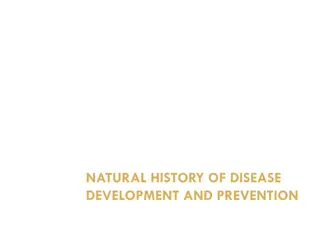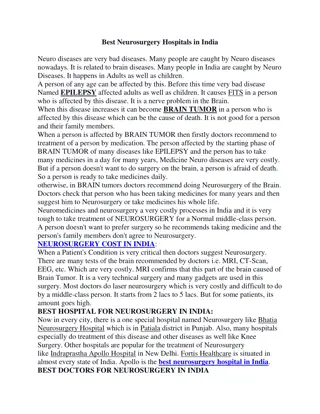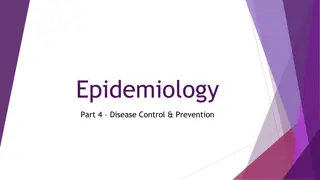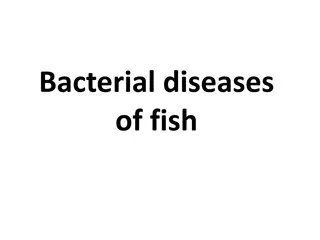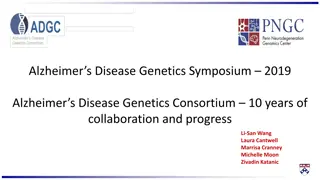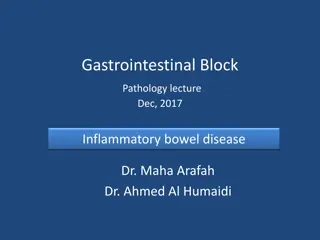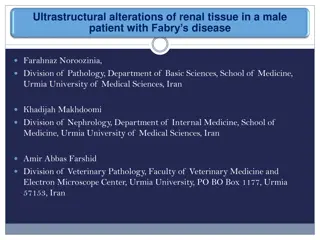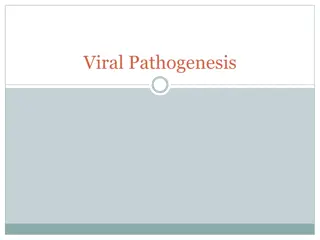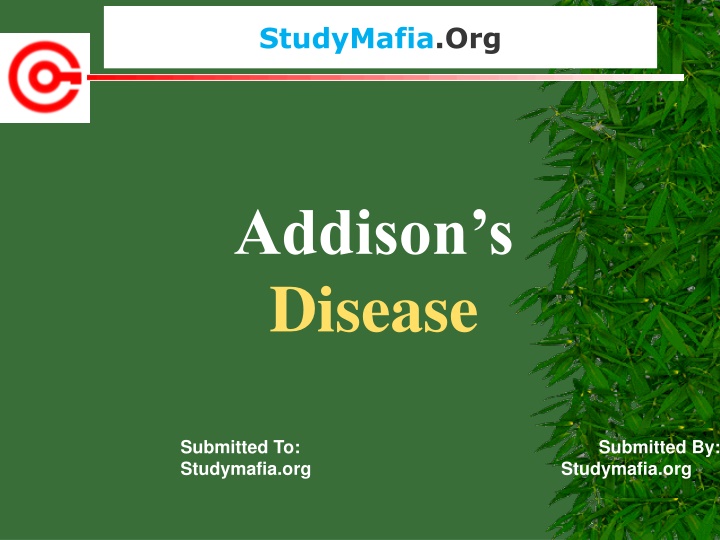
Addison's Disease: Symptoms, Causes, and Treatment
"Addison's disease, also known as adrenal insufficiency, is a rare disorder characterized by inadequate hormone production. Learn about its symptoms, causes, complications, prevention, and treatment to manage this potentially life-threatening condition effectively."
Download Presentation

Please find below an Image/Link to download the presentation.
The content on the website is provided AS IS for your information and personal use only. It may not be sold, licensed, or shared on other websites without obtaining consent from the author. If you encounter any issues during the download, it is possible that the publisher has removed the file from their server.
You are allowed to download the files provided on this website for personal or commercial use, subject to the condition that they are used lawfully. All files are the property of their respective owners.
The content on the website is provided AS IS for your information and personal use only. It may not be sold, licensed, or shared on other websites without obtaining consent from the author.
E N D
Presentation Transcript
StudyMafia.Org Addison s Disease Submitted To: Submitted By: Studymafia.org Studymafia.org
Table Contents Definition Introduction Symptoms of Addison's disease Causes of Addison's disease Complications of Addison's disease Prevention of Addison's disease Treatment of Addison's disease Conclusion 2
Definition Addison's disease, also called adrenal insufficiency, is an uncommon disorder that occurs when your body doesn't produce enough of certain hormones. 3
Introduction In Addison's disease, your adrenal glands, located just above your kidneys, produce too little cortisol and, often, too little aldosterone. Addison's disease occurs in all age groups and both sexes, and can be life- threatening. Treatment involves taking hormones to replace those that are missing. 4
Causes of Addison's disease Addison's disease is caused by damage to your adrenal glands, resulting in not enough of the hormone cortisol and, often, not enough aldosterone as well. Your adrenal glands are part of your endocrine system. They produce hormones that give instructions to virtually every organ and tissue in your body. 6
Causes of Addison's disease The outer layer (cortex) produces a group of hormones called corticosteroids. Corticosteroids include: Glucocorticoids. These hormones, which include cortisol, influence your body's ability to convert food into energy, play a role in your immune system's inflammatory response and help your body respond to stress. 7
Causes of Addison's disease Mineralocorticoids. These hormones, which include aldosterone, maintain your body's balance of sodium and potassium to keep your blood pressure normal. Androgens. These male sex hormones are produced in small amounts by the adrenal glands in both men and women. 8
Complicationsof Addison's disease If you have untreated Addison's disease, you may develop an addisonian crisis as a result of physical stress, such as an injury, infection or illness. Normally, the adrenal glands produce two to three times the usual amount of cortisol in response to physical stress. 9
Complicationsof Addison's disease An addisonian crisis is a life- threatening situation that results in low blood pressure, low blood levels of sugar and high blood levels of potassium. You will need immediate medical care. People with Addison's disease commonly have associated autoimmune diseases. 10
Prevention of Addison's disease Addison's disease can't be prevented, but there are steps you can take to avoid an addisonian crisis: Talk to your doctor if you always feel tired, weak, or are losing weight. Ask about having an adrenal shortage. If you become very sick, especially if you are vomiting and you can't take your medication, go to the emergency room. 12
Prevention of Addison's disease If you have been diagnosed with Addison's disease, ask your doctor about what to do when you're sick. You may need to learn how to increase your dose of corticosteroids. Some people with Addison's disease worry about serious side effects from hydrocortisone or prednisone because they know these occur in people who take these steroids for other reasons. 13
Treatment of Addison's disease Some options for treatment include oral corticosteroids such as: Hydrocortisone (Cortef), prednisone or methylprednisolone to replace cortisol. These hormones are given on a schedule to mimic the normal 24-hour fluctuation of cortisol levels. Fludrocortisone acetate to replace aldosterone. 14
Treatment of Addison's disease Carry a medical alert card and bracelet at all times. A steroid emergency card and medical alert identification will let emergency medical personnel know what kind of care you need Keep extra medication handy. Missing even one day of medication may be dangerous, so keep a small supply of medication at work and with you whenever you travel. 15
Treatment of Addison's disease Carry a glucocorticoid injection kit. The kit contains a needle, syringe and injectable form of corticosteroids to use in case of emergency. Stay in contact with your doctor. Keep an ongoing relationship with your doctor. Have annual checkups. See your doctor or an endocrinology specialist at least once a year. 16
Conclusion Addison's disease, also called adrenal insufficiency, is an uncommon disorder that occurs when your body doesn't produce enough of certain hormones. In Addison's disease, your adrenal glands, located just above your kidneys, produce too little cortisol and, often, too little aldosterone. 18
References Google.com Wikipedia.org Studymafia.org Slidespanda.com
Thanks Thanks To To StudyMafia StudyMafia.org .org



